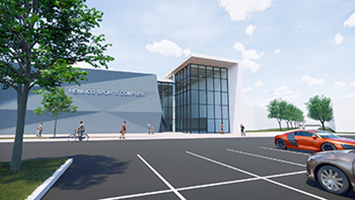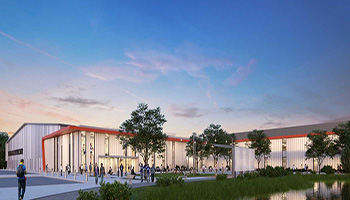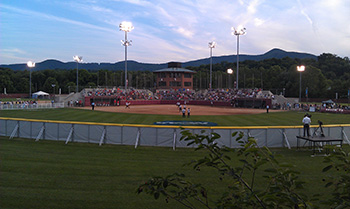Delay of game
Sports tourism takes a timeout amid coronavirus
Don Harrison //April 30, 2020//
The COVID-19 pandemic has paralyzed one of Virginia’s growing economic drivers: sports tourism. But even amid mass cancellations and lost revenue, tourism officials hold out hope that, for the sports sector at least, there can be recovery.
“Over the years, sports tournaments and competitions have generally been recession-resilient,” says Joni Johnson, director of sales at Virginia Tourism Corp. “When the downturn in 2008 occurred, sports was still happening. A lot of families make it their family vacation and travel with their child competing in different sporting events. So, it tends to bounce back.”
The destination experience manager of Visit Virginia’s Blue Ridge, Irisha Jones-Goodman, echoes that sentiment. “Sports tourism has proven to be more resilient to an ever-changing economy,” she says.
Visit Virginia’s Blue Ridge, the official marketing organization for Roanoke, Salem and surrounding counties, established a special division in 2018 to capitalize on sports tourism events in the region, one of several tourism organizations in Virginia to recently shift its marketing focus to sports.
In Richmond, sports events normally account for 60% of bookings for area hotel rooms, says J.C. Poma, director of sports relations at Richmond Region Tourism, which serves the capital city and surrounding jurisdictions.
But with hotels across the commonwealth closed during social distancing and shelter-in-place orders, it’s been a far different story for the last couple months.
However, Poma says, “we aren’t concentrating on the negative. Let’s get through this and look forward to the latter half of the summer and see where we are.”
From b-ball to Quidditch
It’s understandable why Richmond Region Tourism is eager to return to normalcy. Last year, 83 sports events brokered by the not-for-profit destination marketing organization brought in more than 171,500 visitors, producing $62.5 million in direct visitor spending across the region.
“From Eastern Henrico to Southwest Chesterfield [counties], we cover a large area, and we attract a lot of different sports — archery, swimming, Quidditch,” Poma says. “That’s because we have a wide variety of venues at our disposal, from River City Sportsplex in Chesterfield to Glover Park in Henrico to Independence Golf [Club] in Powhatan County.”
In 2019, the consulting firms Huddle Up Group and Resonance Consultancy developed a master plan for Richmond Region Tourism that recommended a staffing shift in order to place a greater emphasis on attracting sporting events. “We are definitely an outdoor sports tourism destination,” Poma says. “The plan reflects that. And now Henrico County is building its indoor complex, and that should help to make us a year-round destination.”

Henrico’s 220,000-square-foot, 4,500-seat indoor sports arena is slated to open in 2022 on the site of Virginia Center Commons mall. The complex will be designed to accommodate amateur and high school basketball, volleyball and other indoor sports tournaments and leagues.
“Virginia is strong in amateur sports,” says Johnson of Virginia Tourism Corp. “We don’t have pro teams per se, so we are all about attracting amateurs. The good thing about those events is that, unlike a business conference, people bring their families too.”
The potential benefits aren’t lost on localities.
“The competition for a larger slice of the sports tourism pie has become increasingly fierce,” says Eric Kulczycky, national sales manager for Visit Fairfax. “Destinations across the country, often in cooperation with their local governments, have been entering into a sort of sports facilities ‘arms race’ to offer more tournament-capable venues with large clusters of outdoor fields, indoor courts and other facility types.”
Complex competition
Sports are a significant tourism revenue source for Fairfax County and other Northern Virginia localities, Kulczycky says. “We have a number of tournament-capable facilities that allow us to target a variety of sports from soccer, basketball and softball to equestrian, underwater hockey and esports.”
The St. James, a privately funded 450,000-square-foot sportsplex, opened in Fairfax in 2018. The county also set up a Sports Tourism Task Force, which recommended a public-private partnership to build an indoor skiing venue in Lorton, as well as a new turfed baseball complex at Patriot Park North and improvements to Fountainhead Regional Park.

“Throughout the state, people are looking at new venues to build or refurbish what they have,” Johnson says. “Virginia Beach is building their new sports center, set to open in November, and they designed that strictly for sports tourism and amateur sports.” The new center will be 285,000 square feet with 12 basketball courts, 24 volleyball courts and a 200-meter, hydraulically banked track. And, Johnson adds, Hampton is moving forward with a plan to construct an aquatic center.
But Norfolk won’t be entering the sports complex “arms race” any time soon.
“There has been an idea to turn the Norfolk Scope into a multiplex sports venue that can do the volleyball tournaments and compete with Richmond and Virginia Beach for those things,” says Kurt Krause, president and CEO of
VisitNorfolk. But for now, it’s just an idea.
VisitNorfolk attracts conference events such as North Eastern Athletic Conference (NEAC) basketball tournaments to existing venues like the Scope, where the NEAC’s men’s and women’s tournaments have been held the last three years. “That amateur multiday event in March brings in $3 million from its five-day run,” Krause says, adding that in 2021 the city will be among the Hampton Roads localities hosting the Amateur Athletic Union (AAU) Junior Olympics, attracting an estimated 18,000 people for a two-week period. Most of the track and field events will take place at Norfolk State University.
Norfolk concentrates on its own built-in sports tourism, he says. “We’re the only city in Virginia that has a Triple-A baseball team, the Tides, and they attract 5,000 people a night to their games. And we have the Admirals, an East Coast Hockey League team, that draws 2,000 to 3,500 to a game.” Next year, he says, Norfolk will be the site of the ECHL All-Star Game.
Don’t stop believing
VisitNorfolk also looks for emerging niche sports. “There is a phenomenon in the urban environment called street soccer,” Krause says. Players use plywood to delineate small, makeshift soccer fields in parking lots or under highway overpasses.
As many as 1,500 people will come to watch the matches, he says, and a Norfolk street soccer league has emerged.

“Sports tourism is big business for Visit Virginia’s Blue Ridge,” Jones-Goodman says, and that includes everything from nontraditional sports such as cornhole, pickleball and disc golf to more well-known pastimes like basketball. Salem, she says, is being branded as “Virginia’s Championship City,” having hosted 87 NCAA championships for basketball, football and softball. “Since many of our hotels are select service properties, meaning they don’t have significant meeting space for large conferences,” Jones-Goodman says, “we rely heavily on sports travel.”
Mostly, that’s softball. “It’s one of our biggest targets due to the large amount of softball facilities in our region,” she says. The Old Dominion Athletic Conference, the Central Intercollegiate Athletic Association, USA Softball and Virginia High School League have held their tournaments in the region.
With the U.S. Olympics postponed because of the coronavirus, a much-anticipated scrimmage in Salem by the USA Softball Women’s National Team looks doubtful for June. “It was a big deal for Salem to have them come and play,” says Danish Saadat, Virginia Tourism Corp.’s national sales and marketing manager in charge of sports marketing.
“With all the cancellations, it’s been devastating,” adds Caroline Logan, director of communications at Virginia Tourism Corp. “We’re seeing such a massive hit to our economy right now. It just goes to show the important role that travel and tourism and the hospitality industries have on Virginia.”
Still, they won’t stop believing.
“I think once this is all over, it will increase demand in sports tourism,” Saadat says. “Because everything that people are missing out on right now, they’ll want again. Small jurisdictions might have a harder time getting out of [the downturn] … but I do think once everything settles, the demand for sports will probably go up, not down.”
“Do you remember when the Titanic was sinking, and the band kept playing?” Logan asks. “Well, we’re the band.”
Read more from the cover story package:
- Unconventional times — Hotels closed, workers furloughed as convention biz dries up
- Virginia hotels, attractions shut down during pandemic
- Conference hotels chart


















